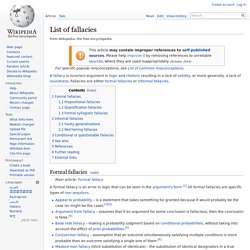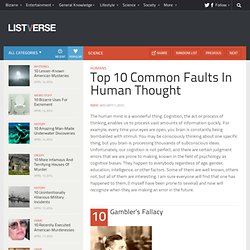

The Corbett Report. Western canon. Origins[edit] The process of listmaking—defining the boundaries of the canon—is endless.

The philosopher John Searle has said: "In my experience there never was, in fact, a fixed 'canon'; there was rather a certain set of tentative judgments about what had importance and quality. Such judgments are always subject to revision, and in fact they were constantly being revised. "[2] One of the notable attempts at compiling an authoritative canon in the English-speaking world was the Great Books of the Western World program. An earlier attempt, the Harvard Classics (1909), was promulgated by Harvard University president Charles W. ... Debate[edit] Defenders maintain that those who undermine the canon do so out of primarily political interests, and that such criticisms are misguided and/or disingenuous.
Tragedy and Hope Communications - A Team of Independent Media Producers with OVER 25 MILLION downloads! Gnostic Media - Trivium Education, Study of Entheogens & Psychedelics, Shamanism, Religion, Mythology & Cults - Gnostic Media. The Tree of Life (The Original, since 1994) Liberal arts. In modern times, liberal arts education is a term that can be interpreted in different ways. It can refer to certain areas of literature, languages, philosophy, history, mathematics, psychology, and science.[3] It can also refer to studies on a liberal arts degree program. For example, Harvard University offers a Master of Liberal Arts degree, which covers biological and social sciences as well as the humanities.[4] For both interpretations, the term generally refers to matters not relating to the professional, vocational, or technical curricula. History[edit] Great Books of the Western World. The Great Books (second edition) Great Books of the Western World is a series of books originally published in the United States in 1952 by Encyclopædia Britannica Inc. to present the Great Books in a single package of 54 volumes.
The series is now in its second edition and contains 60 volumes. The original editors of the series chose three criteria for inclusion: a book must be relevant to contemporary issues, and not only important in its historical context; it must reward rereading; and it must be a part of "the great conversation about the great ideas," relevant to at least 25 of the 102 great ideas identified by the editors. List of fallacies. A fallacy is incorrect argument in logic and rhetoric resulting in a lack of validity, or more generally, a lack of soundness.

Fallacies are either formal fallacies or informal fallacies. Formal fallacies[edit] Main article: Formal fallacy Appeal to probability – is a statement that takes something for granted because it would probably be the case (or might be the case).[2][3]Argument from fallacy – assumes that if an argument for some conclusion is fallacious, then the conclusion is false.Base rate fallacy – making a probability judgment based on conditional probabilities, without taking into account the effect of prior probabilities.[5]Conjunction fallacy – assumption that an outcome simultaneously satisfying multiple conditions is more probable than an outcome satisfying a single one of them.[6]Masked man fallacy (illicit substitution of identicals) – the substitution of identical designators in a true statement can lead to a false one.
A List Of Fallacious Arguments. Top 10 Common Faults In Human Thought. Humans The human mind is a wonderful thing.

Cognition, the act or process of thinking, enables us to process vast amounts of information quickly. For example, every time your eyes are open, you brain is constantly being bombarded with stimuli. You may be consciously thinking about one specific thing, but you brain is processing thousands of subconscious ideas. Unfortunately, our cognition is not perfect, and there are certain judgment errors that we are prone to making, known in the field of psychology as cognitive biases. The Gambler’s fallacy is the tendency to think that future probabilities are altered by past events, when in reality, they are not. Reactivity is the tendency of people to act or appear differently when they know that they are being observed. Pareidolia is when random images or sounds are perceived as significant. Interesting Fact: the Rorschach Inkblot test was developed to use pareidolia to tap into people’s mental states.
Self-fulfilling Prophecy. Alex Jones (radio host) Alexander Emerick "Alex" Jones (born February 11, 1974) is an American radio host, author, conspiracy theorist[1][2] and documentary filmmaker.[3] His syndicated news/talk show The Alex Jones Show, based in Austin, Texas, airs via the Genesis Communication Network on more than 90 AM, FM, and shortwave radio stations across the United States and on the Internet.[4] His websites include Infowars.com and PrisonPlanet.com.[5][6] His YouTube channel has been viewed over 360 million times.[7] Biography[edit] He began his career in Austin with a live, call-in format public-access television cable TV program.

In July, a group of Austin Community Access Center (ACAC) programmers claimed that Jones used legal proceedings and ACAC policy to intimidate them or get their shows thrown off the air.[25] On September 8, 2007, he was arrested while protesting at 6th Avenue and 48th Street in New York City. He was charged with operating a bullhorn without a permit.
Reception and impact[edit] The SOPA Scandal.